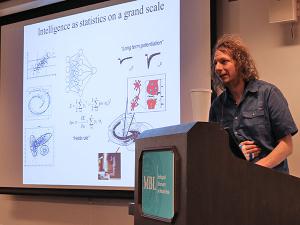Research Thrust: Development of Intelligence
 This series of lectures provides an overview of key insights about the development of cognitive reasoning abilities in infants and young children, and the contrast between aspects of human cognitive development and current approaches to machine learning used in many AI systems. Some of these distinctions are highlighted in the friendly debate between Laura Schulz and Tomer Ullman. The lectures by Joshua Tenenbaum and Sam Gershman elaborate on probabilistic approaches to modeling learning and cognitive development, including Bayesian methods. The e-Book by Noah Goodman and Joshua Tenenbaum, Probabilistic Models of Cognition, provides an overview of probabilistic approaches to modeling cognitive development and introduces the Church programming language.
This series of lectures provides an overview of key insights about the development of cognitive reasoning abilities in infants and young children, and the contrast between aspects of human cognitive development and current approaches to machine learning used in many AI systems. Some of these distinctions are highlighted in the friendly debate between Laura Schulz and Tomer Ullman. The lectures by Joshua Tenenbaum and Sam Gershman elaborate on probabilistic approaches to modeling learning and cognitive development, including Bayesian methods. The e-Book by Noah Goodman and Joshua Tenenbaum, Probabilistic Models of Cognition, provides an overview of probabilistic approaches to modeling cognitive development and introduces the Church programming language.
